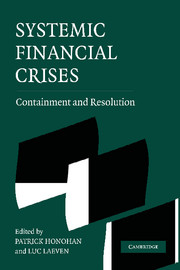Foreword
Published online by Cambridge University Press: 24 August 2009
Summary
Citizens around the world need and demand the opportunity for economic advancement. Many possess entrepreneurial skills that would be the envy of those in high-income countries, as witnessed by their ability to survive in wretched conditions. Recent research, a part of which was contributed by the World Bank, has clearly demonstrated that finance is critical to economic development. One factor that keeps poverty elevated and growth depressed is the absence of reliable financial services. Many developing countries' financial systems are fragile and periodically are beset by crises – events that set back development, leave banks reluctant to lend, and leave citizens wary of entrusting their savings to the official banking sector. This diversion of savings into inefficient forms is likely one of the great and unmeasured costs of banking crises. Banking crises capture headlines when they are overt, leading to runs on individual banks or even on the entire banking system in the form of capital flight, often a sharp reduction in credit (a “credit crunch”), and a concomitant significant reduction in the standard of living. But episodes of systemic bank insolvency often occur without an overt crisis, yet the effects on economic development are just as damaging.
Although the World Bank's role in finance focuses on developing the infrastructure needed to support a robust financial sector, the Bank also is involved in member countries in times of hidden or overt financial crises.
Information
- Type
- Chapter
- Information
- Systemic Financial CrisesContainment and Resolution, pp. ix - xPublisher: Cambridge University PressPrint publication year: 2005
Accessibility standard: Unknown
Why this information is here
This section outlines the accessibility features of this content - including support for screen readers, full keyboard navigation and high-contrast display options. This may not be relevant for you.Accessibility Information
- 1
- Cited by
